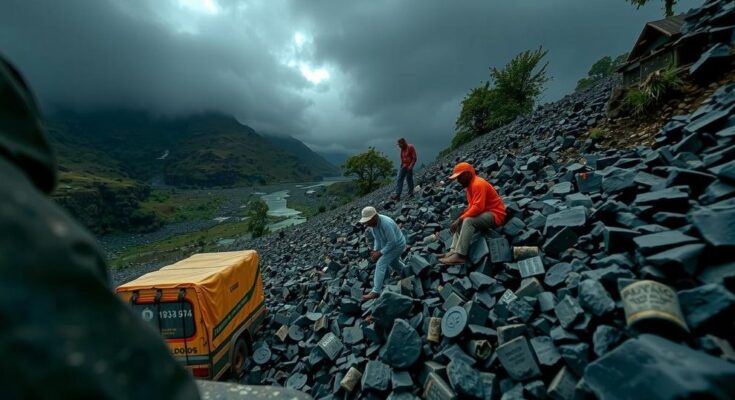Artisanal mining in the DRC accounts for 10-20% of copper and cobalt production, yet miners are subjected to numerous health and safety hazards with little governmental support. Despite promises of formalization and safer conditions, progress remains inadequate. Legislation aimed at creating artisanal zones has not been effective, leading to illegal mining practices, while ongoing concerns regarding exposure to radioactive materials heighten risks for miners and nearby communities. Experts advocate for improved training to minimize these dangers.
The artisanal mining sector in the Democratic Republic of Congo (DRC) faces significant challenges, despite government promises of formalization and better working conditions. Artisanal mining contributes approximately 10-20% of the country’s production of copper and cobalt, yet the miners continue to work under perilous conditions with limited support from authorities. Although the government has expressed intentions to transform the artisanal sector into semi-industrialized mining, little progress has been made over the last two decades. As of now, around 200,000 individuals are involved in artisanal mining in the Katanga region, relying on rudimentary tools in potentially hazardous environments. The DRC government previously pledged to allocate specific zones for artisanal miners under the 2018 Mining Code, yet this has not been executed effectively, leading many miners to operate unlawfully or in areas designated for industrial mining companies. Further, the formation of the Entreprise générale du cobalt (EGC) in 2019 was aimed at improving the conditions of artisanal miners; however, the first mineral allocations were delayed until February 2024. This has led to a situation where the allocated areas for mining are insufficient to support the number of artisans seeking work in the region. Safety concerns remain predominant, as artisanal miners often lack proper equipment and training, exacerbating their exposure to health hazards such as radioactive materials found in the ore. This has raised alarm about the long-term implications for both miners and surrounding communities, where elevated cancer rates have been reported, particularly among children. Experts argue for better training and awareness programs to mitigate these risks, emphasizing that informed miners are better equipped to protect themselves and respond to the environmental dangers associated with their work.
Artisanal mining plays a crucial role in the DRC’s economy, providing livelihoods for millions, yet these miners encounter extreme health and safety risks. The government has shown intentions to regulate and create safer working environments but has failed to implement these promises effectively. Artisanal miners utilize outdated methods with little support or infrastructure, leading to detrimental effects not only on their health but also on the environment around mining sites. Amidst health risks from exposure to radioactive materials and chemicals, there is a pressing need for governmental action and education within this sector.
In conclusion, the situation of artisanal miners in the DRC highlights the pressing need for effective governance and support systems to protect vulnerable workers. The government’s failure to transition the artisanal mining sector into a formalized structure has prolonged the risks these individuals face. Stakeholders must prioritize health and safety training, equitable resource allocation, and sustainable industrial practices to ensure the welfare of artisanal miners and the protection of the environment.
Original Source: news.mongabay.com




